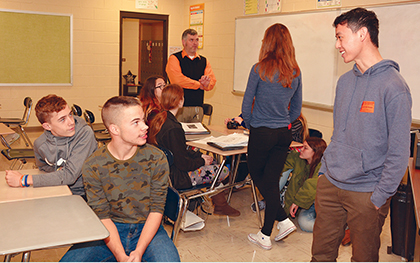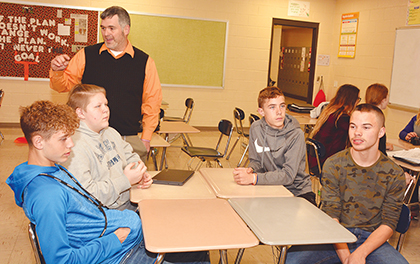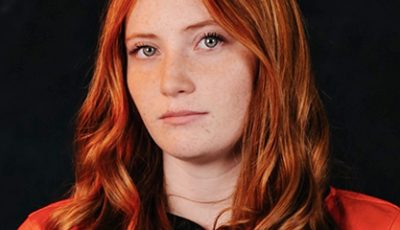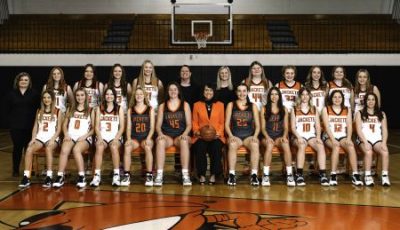W’burg computer students getting high tech help from Google, Intuit, Airbnb engineers
Williamsburg is getting its own app, and the Girls Who Code Club at Williamsburg Independent School is designing it. Another student group is busy digitalizing year books and producing content to be shown on the Jumbotron during ball games.
 The computer programming students, who are getting some real life experience, are getting a real life assist from software engineers from Airbnb, Google and Intuit, which is the company behind Turbo Tax.
The computer programming students, who are getting some real life experience, are getting a real life assist from software engineers from Airbnb, Google and Intuit, which is the company behind Turbo Tax.
Some of those engineers were on hand at Williamsburg High School last week to educate and inspire students in computer programming classes.
“The tourism app that we are building is an app  where people, who are visiting Williamsburg, will have a place where they can find the restaurants around here, hotels, and some of the sites like the waterpark and Cumberland Falls attractions,” said student Katlyn Moses, who is a member of seven person Girls Who Code Club that is helping design the app.
where people, who are visiting Williamsburg, will have a place where they can find the restaurants around here, hotels, and some of the sites like the waterpark and Cumberland Falls attractions,” said student Katlyn Moses, who is a member of seven person Girls Who Code Club that is helping design the app.
“Anything that you are looking for in Williamsburg, we will try and have on the app.”
Moses said that the group hopes to have prices included with things, such as the hotel rooms, restaurants, and “the basic information you  would need to know if you are traveling.”
would need to know if you are traveling.”
Student Holden Clark is one of the students working with the Student Technology Leadership Program (STLP) group to digitalize the 1951 and 1952 Williamsburg yearbooks.
“We are going to be working the Jumbotron during games. We are making slide shows for the girls and boys basketball teams so they can shown during games,” Clark said.
The group has been working on the Jumbotron project  for a couple of weeks.
for a couple of weeks.
Middle school teacher Bill Conn noted that starting with sixth grade, the school is trying to expose students to different types of career pathways, including one in computer sciences.
“This is why we have STLP. This is why we have Girls Who Code,” noted Conn, who helps teach computer sciences at the middle school level.
High school computer science teacher Jacob Jeffers noted that by the time students leave the high school, students in the computer sciences career pathways will have taken two college AP classes and have accumulated 12 credit hours that they can apply towards a computer science degree.
“There are also industry certifications that they may receive, like any type of Microsoft certification. They do cyber security and different things. There are different things for students to choose what certifications they want,” Jeffers added.
The students in these classes are being at least partially taught by real life experts, who volunteer through a program called TEALS to help teach computer science in Williamsburg. (We will get back to what TEALS stands for in a little bit.)
“We have been teaching Mr. Jeffers class in computer science since the start of the school year. It has been a great experience. We go in remotely and pair a program with the students. It has been great to see them grow in what they have built,” noted Airbnb’s Hannah Squier, who lives in San Francisco.
Intuit’s Tony Dinh noted that the group is trying to teach the students the foundation of computer science.
“Computer science is a very broad foundation that can be used for other subjects,” Dinh added.
Mohamed Zoweil, an Egypt native, who formerly worked at Microsoft Xbox and now works at Google, noted that he received an e-mail one day telling workers about the program. He attended a presentation informing workers more about the program, and decided to sign up.
He got some training over the summer on how to do the classes and over the tools used in it, and then he was ready to get started.
Squier, who had never been to this portion of the country, noted it has been really cool to see how the students live.
TEALS stands for Technology, Education and Literacy in Schools.
Initially the three computer software engineers couldn’t remember what the acronym stood for. They Googled it.










